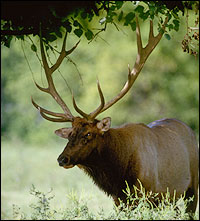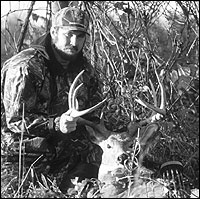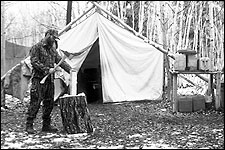October 28, 2010
By Bill Vanzis
You've finally booked the hunt of your dreams, but whose fault is it if you return empty handed?
By Bill Vanzis
 Those who don't rely on their guide's advice concerning trophy potential might just shoot a lesser-quality animal. Is this bull worth a shot? If you were not sure, then this bull may have already given you the slip. Trust the guide. |
Ever hear about the House of Excuses?" my uncle asked me one day when I was a teenager. Before I could tell him that I had not, he informed me, rather smugly, that it had never been built, and if I ever wanted to amount to anything, I had to stop blaming others and take responsibility for my actions. "It is the only way a man can take charge of his life," he told me. It was good advice back then, and it is still good advice today.
Unfortunately, the affliction is still with us. Indeed, when visiting local pro shops I hear story after story about local bowhunters failing to fill a tag because the outfitter was a bum or someone else in camp got preferential treatment. Rarely do I hear that the reason they failed to fill a tag was their own ineptitude, as is so often the case.
Advertisement
Sure, you can book with a criminal outfitter, and camp jealousies can just about ruin a trip. Even the weather can turn against you. As if that weren't enough to contend with, sometimes the four-legged critters we chase simply outsmart us. That is, after all, why we call it hunting and not shopping. Nonetheless, there are times when we seem to be our own worst enemies when we are afield with a bow in our hands. Here are five reasons, not excuses, why we sometimes fail to fill a tag.
Guiding The Guide
I love this one. Why bowhunters book hunts in Canada or out west, or anyplace else for that matter, and then show up in camp thinking they know it all is beyond me. A guy like this is going to do it his way because, after all, he is an expert back home on hogs or whitetails or whatever. (And if he isn't a bonafide hero himself, someone in his family or circle of friends is.)
Advertisement
Nine times out of 10, however, these guys have never even seen a moose or a black bear or an elk before in the wild, and they don't have the foggiest idea how to find one, much less set up for a shot. Instead of listening to the advice of the expert they hired, they blunder ahead without a clue of what to do.
One bear camp I shared illustrated this point splendidly. "Danny" had never hunted black bear before, but he was a top 3-D shot back East (at least that is what he told us) and somehow this made him an expert black bear hunter. He wasn't about to take a back seat to any hillbilly guide, and no one was going to tell him which bait he should hunt.
Well, on the third night out, Danny was advised to hunt a bait station along a small creek due to a change in wind direction. This bait had only been hit once in the last four days, but the guide was sure a bruiser of a bear was in the vicinity. "Danny," however, wanted to hunt a different site, the clear-cut bait, because it was being hit nightly. The guide told Danny that the clear-cut bait was being demolished regularly by a sow with twin cubs, but Danny insisted he was right and the guide was an idiot.
Well, my buddy sat on that creek bait for the next three nights and nailed a 400-pound bruin, whereas Danny went home with all his arrows intact, complaining, of course, that the outfitter and his guides were all crooks. He did see a sow with two cubs, however. Does this mean that all guides are experts? Of course not.
Sometimes they do not understand the needs of a bowhunter. Your job then is to educate them to the limitations of the sport. Remember, guided hunts are really team sports, and the better you and your guide work together, the more likely you will be to go home with a trophy.
The Wrong Equipment
Most outfitters have compiled an equipment list worked out after years of experience. It is to their advantage, for example, that you arrive in camp with suitable clothing and the proper tackle. This helps the camp run smoothly and increases your odds of having a successful trip.
The list does not mean, however, that you can make substitutions without first getting an OK from the outfitter. For example, one western outfitter asked his clients to bring riding boots with narrow toes, not felt-lined packs. They would be spending a lot of time on horseback, he told them, and sliding a pair of thick-soled, rubber-bottomed pacs into a pair of stirrups could make riding difficult. The outfitter also advised each hunter to bring a sling for his bow.
Well, you guessed it, one nimrod showed up in camp with two pairs of calf-high, heavy-duty, size-13 felt boots and no bow sling. It was all he could do to squeeze his boots into the stirrups, which was bad enough, but he had even more trouble extricating his boots from those stirrups when it was time to dismount. This can be a dangerous practice if the horse decides to run off with one of your feet still stuck in the stirrups. We used a length of cord and fastened a bow sling for him, but he had to finish the late autumn hunt by riding bootless. Brrrr!
The moral of this story is simple. Don't question the outfitter's wisdom from your living room 3,000 miles away. If the outfitter tells you to bring good-quality heavy-duty rain gear, don't pack a flimsy disposable plastic suit just so you can save a few dollars. If he suggests a pair of full-size eight-power binoculars, don't bring a pair of mini 6x's. If he suggests you travel light, don't be like the caribou hunter I ran into a few years ago on the tundra. His "war chest" of spare archery tackle weighed more than 50 pounds. He got it into camp, but due to weight considerations on the flight out--which was heavy with meat, hides and antlers--he wasn't able to bring it all home with him.
 One of the reasons you hire a guide or an outfitter is to put you in an area flush with game. Keep in mind that you only have five or six days to fill your tag. You're paying for the opportunity to skip the scouting and spend all your time hunting. Success depends on your ability to follow direction and concentrate on the task at hand. |
Does this mean the outfitter is always right? Hardly. One year, while caribou hunting, an outfitter talked me into getting into his Cessna 180 for a quick flight to a neighboring camp. We would be back before dark, he assured me. Well, it took a half dozen attempts to get airborne because the lake had whitecaps, and then we were grounded at the next camp for three days due to inclement weather.
That
pilot, by the way, killed himself and two hunters the following fall after crashing his plane on take-off. He thought he was a real bush pilot, but the whitecaps proved otherwise. Today I won't get into a float plane without a sleeping bag and a toothbrush, and I won't fly with a "hot dog," either.
Too Tired To Finish
The first night of any camp is generally filled with high spirits and plenty of enthusiasm. Heck, we all like to make new friends and exchange hunting stories, but starting out the hunt on two hours of sleep can leave you overly tired for the rest of the trip. In fact, lack of proper rest is probably the number-one reason why good bowhunters fail to fill a tag on an outfitted hunt. They are just too pooped to hunt savvy all week long.
A few years back I was in elk camp with two guys who, with the help of a bottle of bourbon, burned their candles at both ends, keeping the camp half awake until the wee hours of the morning with their gibberish. Not surprisingly, they were both exhausted and all done hunting by the middle of the week, and they elected to sleep in when the cook woke us up for breakfast.
That didn't sit right with the outfitter, who based his reputation on the high success rates of his clients. "All right, you two, get your butts out of bed right now!" he yelled that frosty morning. "You are not staying in camp alone. The horses are saddled and ready to go. You either get up and get ready to ride right now, or get up and pack your bags. If you are not down by the corral in 10 minutes, the cook will drive you back to town. And forget about getting a refund. I met my end of the bargain. You don't want to hunt, then you are going home!"
Those two bowhunters did get out of bed, but they were miserable the rest of the week. They blamed the outfitter's hard-driving attitude for their lack of success, but the truth of the matter is that they failed because they wanted to party more then they wanted to hunt.
Unbecoming Attitude
Big-game camps usually run smoothly, with clients remaining cordial for the duration of the trip. It is not unusual for hunters to make plans to share a camp again sometime in the future, but once in a great while things fall apart. Anything can trigger a change in atmosphere, from a client feeling overwhelming pressure to punch a tag to outright jealousy that a trophy animal was taken by someone else. Whatever the reason, the hunt of a lifetime can suddenly become the hunt from hell.
The worst I ever witnessed took place in a wilderness black bear camp a decade ago. "Steve," who owned an archery pro shop, started criticizing the outfitter and his staff before he ever arrived in camp.
By midweek, Steve was throwing temper tantrums that included tossing food across the table and threatening to bring physical harm to the outfitter. His sarcastic and argumentative behavior seemed to mask a certain fear of failure, and no amount of reassurance could calm him. It wasn't until the rest of the hunters told him to clean up his act or he would be forced from camp that he begin to settle down. Even so, he did not fill a tag. My guess is that his sharp tongue with the guides, who undoubtedly repaid him in spades, and his lack of patience on stand cost him dearly.
Fortunately, these are rare events. Nonetheless, you can avoid bowhunters with big egos and those with chips on their shoulders by choosing your hunting partners carefully. A good booking agent can also help screen unsavory people from your bow camp, thus increasing your odds of a positive experience.
The Man Says Shoot
One of the reasons we hire outfitters and guides is to lead us to an area teaming with wild game and then to help us pick out a trophy specimen. Indeed, some game animals such as caribou, pronghorn, elk, moose, black bear and mule deer can be difficult to field judge if you have never seen one in the wild before.
 Most of the camp chores are done for you on a guided hunt, giving you more time to do what you came there to do--hunt. Make the most of the opportunity. |
It behooves us, then, to rely on a guide/outfitter to steer us in the right direction. You don't want to shoot a rag bull in an area with a five-point rule or the first caribou you see until you get a handle on field judging them. At first glance, all caribou antlers look huge.
Several years ago, I watched a caribou hunter on his first morning on the tundra stalk a cow feeding along a rocky outcropping. Cows, he was told back at camp, can sport antlers that rival those of a big whitetail. I quickly joined him and pointed out that the "bull" he thought he was putting the sneak on was not a bull at all but a racked cow.
He told me, rather emphatically, that this particular caribou had a bigger rack than any buck he had ever seen. He would have shot that cow, too, despite my warnings, until he watched her urinate. He just looked at me rather sheepishly then slid his arrow back into the quiver and walked away. He never could bring himself to admit he had almost made a mistake that day. If he were alone, he would have.
A similar event took place with a different bowhunter a few years later on a trophy elk hunt in the Rocky Mountains. "Jim" had booked a horseback hunt with a well-known outfitter and hunted hard all week long with no luck. Then on the last day they had a bull answer the bugle. In a matter of minutes the giant bull bugled again from less than 40 yards away. The outfitter quickly told the client to shoot, as this bull would surely score high in Pope & Young. Jim, however, could not see the rack and refused to unleash a broadhead despite the repeated whispered advice of the outfitter. Well, you guessed it. The bull eventually high-tailed back up the ridge, and when he passed through an opening, Jim realized his mistake. The outfitter just glared at him. "Why did you book with me?" Terry asked him after the bull was gone. "I told you he was a book bull, but you refused to take my advice. If you think you can do better by yourself, then next time hunt by yourself. You just blew the opportunity of a lifetime."
Indeed, that is usually what happens when you try to guide the guide, bring the wrong equipment, are too tired to hunt hard all week, come to camp packing an attitude or simply fail to heed the advice you contracted for. You go home empty-handed. And you know what? It is nobody's fault but your own.

